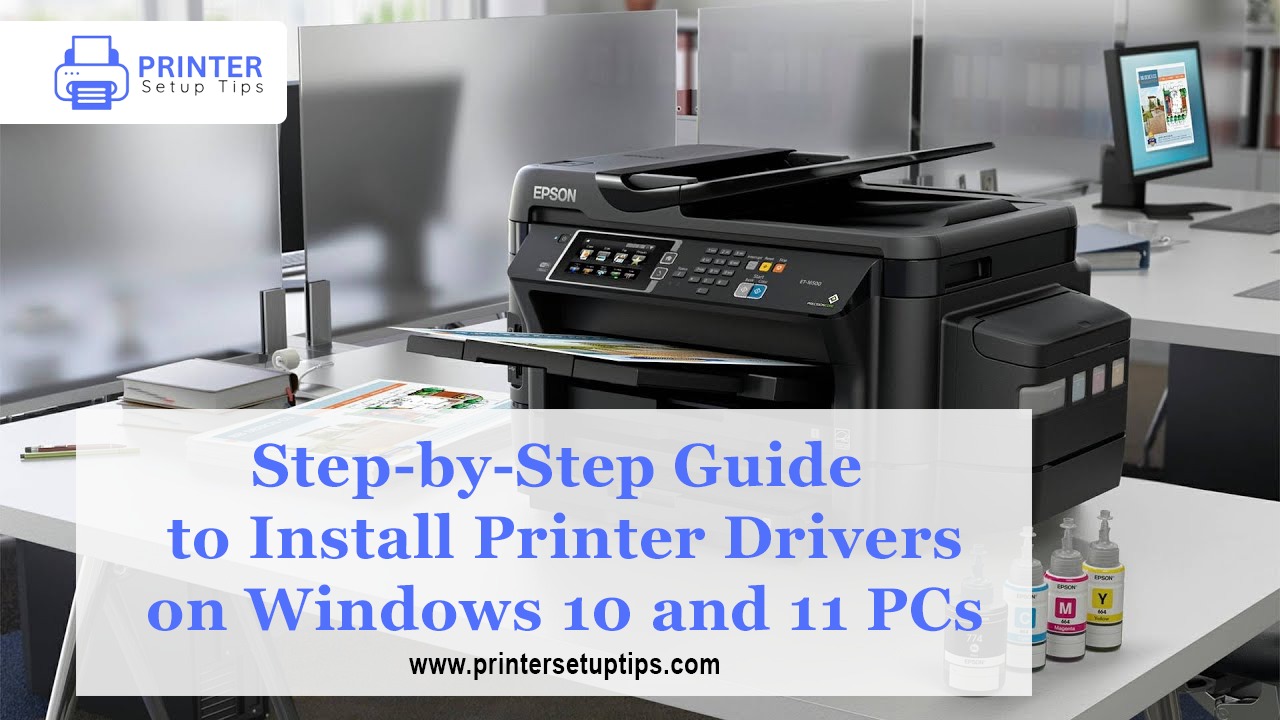Installing
the correct printer driver is crucial for ensuring that your printer operates
seamlessly with your computer. Regardless of whether you have an HP, Canon, or
Epson printer, correct driver installation can help avoid printing errors and
enhance performance. This guide on printer driver installation will assist you
in setting up, updating, and troubleshooting printer drivers on Windows 10 and
11 PCs.
🔹 What Are Printer
Drivers?
Printer
drivers are specific software applications that facilitate communication
between your computer and printer. Without these drivers, your system is unable
to send the correct commands to the printer, leading to printing errors or
malfunctions. Drivers convert digital data into a format that the printer can
interpret — akin to a translator bridging two different languages.
🔹 Why You Need to
Install or Update Printer Drivers
•
To ensure compatibility with updates for Windows 10 or 11.
•
To enhance printing performance and speed.
•
To resolve current printing errors or connectivity problems.
•
To access new printer functionalities such as wireless printing and duplex
printing.
If
you are upgrading your operating system or experiencing connection
difficulties, it is vital to update the printer driver for Windows 11 to the
latest version.
🔹 Methods to
Install Printer Drivers on Windows 10 and 11
Here
are the most effective methods for safely and efficiently installing printer
drivers.
1. Automatic Printer Driver Installation
Windows
10 and 11 can automatically recognize most printers and install the necessary
drivers. Follow these steps:
1.
Connect your printer to your PC using USB or Wi-Fi.
2.
Power on the printer.
3.
Navigate to Settings → Devices → Printers & scanners.
4.
Click on Add a printer or scanner.
5.
Windows will automatically search for and install the required drivers.
This
process is known as automatic printer driver installation software, and it is
effective for most modern printers.
2. Manual Printer Driver Installation from Manufacturer’s Website
If
the automatic installation fails, you can manually download and install the
driver.
•
For HP Printers: Visit the official HP website, search for your model, and
click on HP printer driver download and install. Follow the on-screen
instructions to complete the setup.
•
For Canon Printers: Navigate to Canon’s support page, find your model, and
follow the step-by-step process for Canon printer driver installation.
•
For Epson Printers: Go to Epson’s official site, locate your printer, and
adhere to the guided Epson printer driver installation process.
These
drivers are typically optimized for performance and compatibility with your
specific printer model.
3. Install a Wireless Printer Driver
If
you have a Wi-Fi-enabled printer, you can connect it easily without the need
for cables.
Steps
for setting up the printer driver for a wireless printer:
1.
Turn on your wireless printer and connect it to your Wi-Fi network.
2.
On your computer, navigate to Settings → Devices → Printers & scanners.
3.
Click on Add a printer or scanner.
4.
Select your wireless printer from the available list.
5.
Follow the prompts to install the drivers automatically or manually if
necessary.
Wireless
setup allows you to print from anywhere within your network.
4. Using Device Manager to Update Drivers
To
manually update the printer driver on Windows 11:
1.
Press Windows + X → Device Manager.
2.
Expand the Printers section.
3.
Right-click on your printer name and select Update driver.
4.
Choose Search automatically for updated driver software.
This
method guarantees that you always have the latest and most stable driver
installed.
🔹 How to Install
Printer Drivers on Mac
While
this article primarily addresses Windows, Mac users can also follow a
straightforward process to install printer drivers on Mac:
1.
Connect your printer using USB or Wi-Fi.
2.
Access System Settings → Printers & Scanners.
3.
Click on Add Printer and select your printer.
4.
macOS will automatically download and install the appropriate driver.
For
advanced users, manual installation from the manufacturer’s website is also an
option.
🔹 Fixing Printer
Driver Installation Errors
At
times, you may face challenges during the installation process. Here’s how to
resolve printer driver installation errors:
•
Make sure your printer is turned on and correctly connected.
•
Temporarily disable your antivirus or firewall while installing.
•
Uninstall any old printer drivers before adding new ones.
•
Utilize the Windows Troubleshooter:
o
Navigate to Settings → Update & Security → Troubleshoot → Additional
troubleshooters → Printer.
•
After finishing the installation, restart your computer.
If
problems continue, completely uninstall the printer and then reinstall it from
the beginning.
🔹 Tips for Smooth
Printer Driver Setup
•
Always obtain drivers from the official websites of the manufacturers.
•
Ensure your system and printer firmware are up to date.
•
Consider using automatic printer driver installation software for ease of use.
•
Steer clear of third-party driver websites to minimize security threats.
•
Regularly verify for driver updates, particularly after Windows upgrades.
🔹 Final Thoughts
Correct
installation of printer drivers guarantees that your printer operates
flawlessly with Windows 10 and 11. Whether you are setting up HP, Canon, or
Epson printers, adhering to a structured method helps prevent typical setup
problems. This guide encompasses everything you need for efficient printer
operation, from automatic installations to manual setups and troubleshooting.
Keep your drivers current, and your printer will consistently deliver optimal
performance — ensuring clear, dependable prints every time.

